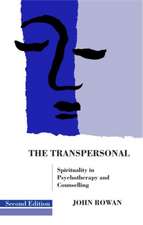Psychotherapy of Everyday Life: Training in Partnership and Self-Help
Autor Nossrat Peseschkianen Limba Engleză Paperback – 1986
In this book East and West are united in a total vision which gives the reader an expansive view of inner lives and behaviors, some of which are healthy and some not. The author presents an analysis of contemporary social relationships and the attitudes associated with them. But he does far more than this. He also vividly describes the "primary" and "secondary" capabili ties of the psyche, capabilities that are valid for all times and all situations. Peseschkian draws on his experiences in the Middle Eastern homeland of his youth and also on the insights he has gained through his psychotherapeutic practice. He does not stop with special examples, but draws conclusions that are valid for people everywhere. He then molds these conclusions into an illustrative system. Uniquely interesting are the passages where the author describes errors in the development of a child and erroneous attitudes on the part of the educator, such as when he characterizes the punitive behavior of parents: "Right from the start a child must learn to obeYi" "There must be punishmenti" and "You have to break the child's wilL" Or when he shows how tensions between the parents are transferred to their children: "You're just like your father. He doesn't know what punctuality is either. " The author attempts to integrate his faith in psychotherapy with his vision of the world and also tries to understand the world's religions as an expression of their times.
Preț: 709.72 lei
Preț vechi: 747.06 lei
-5% Nou
135.81€ • 142.15$ • 113.03£
Carte tipărită la comandă
Livrare economică 31 martie-14 aprilie
Specificații
ISBN-10: 3540157670
Pagini: 264
Ilustrații: XIV, 250 p. 15 illus.
Dimensiuni: 127 x 203 x 14 mm
Greutate: 0.27 kg
Ediția:Softcover reprint of the original 1st ed. 1986
Editura: Springer Berlin, Heidelberg
Colecția Springer
Locul publicării:Berlin, Heidelberg, Germany
Public țintă
ResearchCuprins
Tips for the Reader.- Who is Healthy?.- Learn to Make Distinctions.- Psychotherapy Instead of Psychopathology.- Self-Help.- Why Stories, Parables, and Myths?.- How Did Positive Psychotherapy (Differentiation Analysis) Arise?.- Treatment Shortened?.- Three Focal Points of Differentiation Analysis.- A Guide to the Book.- Psychotherapy Today.- I: Differentiation Analytical Theory.- Thoughts on (Positive Psychotherapy) Education.- Shadows on the Sundial.- Education and Reeducation.- Desperation and Hope.- Functional change in Education and Psychotherapy.- Social Conflicts — Norms.- Examples of Social Conflict Situations in Education.- Examples of Social Conflict Situations in Psychotherapy.- Differentiation Analytical Theory (Positive Psychotherapy).- Actual Capabilities.- Basic Capabilities.- Actual and Basic Conflict.- Parental Types.- II: Actual Capabilities (Primary and Secondary Capabilities).- Actual Capabilities.- The Sightseers and the Elephant.- What are the Functions of the Actual Capabilities?.- Is One Actual Capability More Important than Another?.- Primary Capabilities.- Capabilities: The Influence of Anxiety, Aggression, and Imitation.- Model.- Faith.- Time.- Doubt.- Hope.- Trust and Confidence.- Patience.- Certainty.- Love — Contact — Sexuality.- Unity.- Anxiety, Aggression, and Imitation as Potential Sources of Conflict.- Secondary Capabilities.- The Girl with the Red Velvet Dress.- Punctuality.- Cleanliness.- Orderliness.- Obedience.- Politeness.- Honesty.- Justice.- Ambition — Achievement.- Frugality.- Dependability — Exactness — Conscientiousness.- III: Misunderstandings in Child-Raising, Partnership and Psychotherapy.- Misunderstandings.- About the Crow and the Peacock.- The Goal and Content of Child-Raising.- The Relativity of Values.- The Dimension of Time and the Image of Man.- Development.- Identity Crisis.- Man — Animal.- Inborn — Acquired.- Uniqueness.- The Unconscious.- Identification — Projection.- Generalization.- Prejudice.- Man and Wife.- Justice — Love.- Sex.- Sex — Sexuality — Love.- Caricatures of Love.- Loss of Unity.- Health — Sickness.- Faith — Religion — Church.- Conditional and Determined Fate.- Death.- IV: Education — Self-Help — Psychotherapy.- An Easy Cure.- to Self-Help.- Three Basic Principles of Interpersonal Relationships.- Interaction Analysis.- Model of the Stages of an Interaction.- Self-Help.- Stage 1: Distancing/Observation.- Stage 2: Inventory.- Stage 3: Situational Encouragement.- Stage 4: Verbalization.- Stage 5: Goal Expansion.- Family Group — Parental Group — Partner Group.- Other People’s Problems.- The Family Group.- The Parent Group.- The Partner Group.- Differentiation Analysis Psychotherapy.
Descriere
In this book East and West are united in a total vision which gives the reader an expansive view of inner lives and behaviors, some of which are healthy and some not. The author presents an analysis of contemporary social relationships and the attitudes associated with them. But he does far more than this. He also vividly describes the "primary" and "secondary" capabili ties of the psyche, capabilities that are valid for all times and all situations. Peseschkian draws on his experiences in the Middle Eastern homeland of his youth and also on the insights he has gained through his psychotherapeutic practice. He does not stop with special examples, but draws conclusions that are valid for people everywhere. He then molds these conclusions into an illustrative system. Uniquely interesting are the passages where the author describes errors in the development of a child and erroneous attitudes on the part of the educator, such as when he characterizes the punitive behavior of parents: "Right from the start a child must learn to obeYi" "There must be punishmenti" and "You have to break the child's wilL" Or when he shows how tensions between the parents are transferred to their children: "You're just like your father. He doesn't know what punctuality is either. " The author attempts to integrate his faith in psychotherapy with his vision of the world and also tries to understand the world's religions as an expression of their times.



















